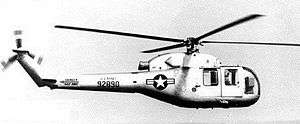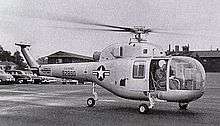Sikorsky XH-39
The Sikorsky XH-39 (manufacturer designation S-59), developed by Sikorsky Aircraft in 1954, was the U.S. Army's first turbine-powered helicopter. It was fast and innovative, but ultimately rejected by the United States Army in favor of the Bell UH-1 Iroquois.
| XH-39 (S-59) | |
|---|---|
 | |
| Sikorsky XH-39 | |
| Role | Helicopter |
| Manufacturer | Sikorsky Aircraft |
| First flight | 26 August 1954 |
| Introduction | not produced |
| Primary user | United States Army |
| Number built | 1[1] |
| Developed from | Sikorsky S-52 |
Design and development
The four-seat XH-39 was powered by one Continental CAE XT51-T-3 400 shp (298 kW) turboshaft engine, a license-built development of the Turbomeca Artouste. It was developed from a previous Sikorsky model, the H-18 (company model S-52), and had the same layout. It differed in using retractable landing gear, modified tail rotor, and four-blade main rotor.[1] In the end, the U.S. Army selected the Bell XH-40, prototype of the UH-1 Huey. Two YH-18As were modified into XH-39s; one for flight testing and the other for static test.
On 26 August 1954, the XH-39 set a world helicopter speed record of 156.005 mph (251 km/h) over a three kilometer closed course at Bradley Field (now Bradley International Airport) in Windsor Locks, Connecticut.[2] The same year, on October 17, 1954, it set an unofficial world helicopter altitude record of 24,500 ft (7,474 m) at Bridgeport, Connecticut.[3]
In addition to the two XH-39s, one S-59, serial number 52004, registration number N74150, was produced for use for company demonstration flights.[2] It has been restored and is now on display at the New England Air Museum, Windsor Locks, Connecticut.[4]
Variants
- XH-39
- Former YH-18A modified for static testing, not flown and later modified back to YH-18A standard.
- XH-39A
- Former YH-18A modified for flight testing.
Specifications (XH-39)

.jpg)
Data from U.S. Army Aircraft Since 1947[5]
General characteristics
- Crew: One
- Capacity: 3 passengers
- Length: 41 ft 0 in (12.50 m)
- Height: 9 ft 7 in (2.92 m) (to top of rotor head)
- Empty weight: 2,105 lb (955 kg)
- Gross weight: 3,361 lb (1,525 kg)
- Powerplant: 1 × Continental CAE XT51-T-3 turboshaft, 400 shp (300 kW)
- Main rotor diameter: 35 ft 0 in (10.67 m)
- Main rotor area: 962 sq ft (89.4 m2)
Performance
- Maximum speed: 156 mph (251 km/h, 136 kn)
- Cruise speed: 138 mph (222 km/h, 120 kn)
- Range: 280 mi (450 km, 240 nmi)
- Service ceiling: 17,900 ft (5,500 m)
See also
Related development
Aircraft of comparable role, configuration and era
Related lists
References
Notes
- Polmar and Kennedy 1981, p. 288.
- http://www.sikorskyarchives.com/S-59.php
- Hearst Magazines (February 1955). "Sets Helicopter Record". Popular Mechanics. Hearst Magazines. p. 113.
- http://neam.org/index.php?option=com_content&view=article&id=882
- Harding 1990, p. 233.
Bibliography
- Harding, Stephen. U.S. Army Aircraft Since 1947. Shrewsbury, England: Airlife, 1990. ISBN 1-85310-102-8.
- Polmar, Norman and Floyd D. Kennedy, Jr. Military Helicopters of the World: Military Rotary-wing Aircraft Since 1917.. Annapolis, Maryland: Naval Institute Press, 1981. ISBN 0-87021-383-0.
External links
| Wikimedia Commons has media related to Sikorsky S-59. |
- "Sikorsky Model XH-39 (S-59)." at Global Security (accessed 12 May 2008)